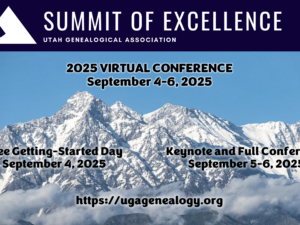Navigating Federal Records Collections: A Researcher's Guide to Historical Discovery
- Description
- Curriculum
Explore the federal records of our nation through this extensive course aimed at enhancing the investigation of archival materials. Participants will acquire fundamental skills for exploring the extensive collections of the National Archives, Library of Congress, and various federal repositories, utilizing historical documents, photographs, maps, and artifacts that shed light on our national history. The incorporation of practical exercises featuring case studies will enhance the instructional quality of the course. Participants will acquire knowledge in utilizing finding aids, digital databases, and classification systems, while simultaneously honing their skills in document analysis, contextual interpretation, and research historiography. The course explores both in-person and digital access methods, proper handling of delicate materials, and strategies for piecing together compelling historical narratives from government records. Whether you’re interested in genealogy, academic research, or public history, this course will equip you with the tools to become an effective historical investigator in federal records.
Note: First week will be Wednesday, February 18. All times are listed in Mountain Time Zone.
Week 1: Wednesday, February 18
5:00-5:30pm, Welcome meeting and introductions
5:30-6:45pm, Introduction to the Records of the National Archives
Instructor: Michael L. Strauss, AG
The U.S. government branches have long collected and preserved historically significant materials for research; however, losses over time have spurred efforts to house priceless documents in secure, publicly accessible environments. This lecture introduces students to the archival systems that safeguard these records: the National Archives, Archives II, and the National Personnel Records Center in St. Louis, Missouri, detailing their organization, cataloging procedures, and research access.
7:15-8:30pm, Unlocking your Families Hidden Story: Harnessing the Power of the United States Census
Instructor: Michael Brophy
The United States Census, a decennial population count mandated by the U.S. Constitution, has played a pivotal role in shaping the nation since its inception. This comprehensive survey, conducted every ten years, aims to collect vital demographic and socioeconomic data about the American population.
8:30-9:00pm, National Archives Research Assignment
Instructor: Michael Strauss, AG
Week 2: Thursday, February 26
5:00-5:30pm, National Archives Research Assignment Review
Instructor: Michael Strauss, AG
5:30-6:45pm, Tax Tracks: Navigating Federal Tax Records for Genealogical Research
Instructor: Michael Brophy
Federal tax research can provide valuable insights into the lives of our ancestor, offering a deeper understanding of their financial situations, occupations, and community roles, and much more.
7:15-8:30pm, Bankruptcy to Equity: Using Federal Court Records
Instructor: Michael Strauss, AG
Was Grandma a bootlegger? Did Grandpa pay his taxes? Records of the Federal courts are among the National Archives’ largest holdings-and yet some of the least used records. Open a new chapter of your family history and discover little-known branches in your family tree as the records of the Federal Court system are discussed in detail
8:30-9:00pm, United States Court Records Assignment
Instructor: Michael Strauss, AG
Week 3: Thursday, March 5
5:00-5:30pm, United States Court Records Assignment Review
Instructor: Michael Strauss, AG
5:30-6:45pm, United States Government Documents-Part I
Instructor: Michael Strauss, AG
Published United States Government records can touch the lives of ordinary people in ways not ever imagined. The first session covers foundational records of the early Republic years in the United States and how the records intersect with communities and national events. Beginning with the Papers and Journals of the Continental Congress, exploring petitions, military service, financial claims, land grants, and civilian interactions with the emerging nation. Next to examine the American State Papers and the Congressional Serial Set to bridge the modern federal system, showing how subject-based volumes on public lands, military, Native American affairs, claims, commerce, and naval matters reveal personal stories and individual persons listed in government documents can be located. This session concludes with the Statutes at Large that explore the laws of the United States Government.
7:15-8:30pm, United States Government Documents-Part II
Instructor: Michael Strauss, AG
This session shifts from legislative records to executive and administrative publications that reveal the human side of federal activity, beginning with key military compilations such as the Official Records of the War of the Rebellion (OR) and the Official Records of the Union and Confederate Navies (ORN) to trace soldiers, sailors, civilian employees, battles, correspondence, and court-martial proceedings. We then explore the Official Register of the United States (“Blue Book”), an essential directory listing every federal employee—ideal for tracking customs officials, postal workers, clerks, and military staff. Additional sources include Congressional hearings and investigations, executive department annual reports, government manuals, gazetteers, and surveys to tie together a variety of records explored in both sessions.
8:30-9:00pm, U.S. Government Documents Assignment
Instructor: Michael Strauss, AG
Week 4: Thursday, March 12
5:00-5:30pm, U.S. Government Documents Assignment Review
Instructor: Michael Strauss, AG
5:30-6:45pm, Military Records I-Service Records and Personnel Files
Instructor: Sandra Rumble
General Frederick C. Ainsworth, head of the Record and Pension Office, initiated the indexing and cataloging of Compiled Military Service Records (CMSRs) covering volunteer soldiers from the Revolutionary War through the Philippine Insurrection. In the 20th century, CMSRs were replaced by Official Military Personnel Files (OMPFs), now housed at the National Personnel Records Center (NPRC) in St. Louis, Missouri, which holds millions of personnel, medical, and payroll records. On July 12, 1973, a devastating fire destroyed millions of military files. This lecture will explore how researchers use auxiliary sources—unit morning reports, pay vouchers, and hospital records—to reconstruct lost files after the fire.
7:15-8:30pm, Military Records II-Draft and Selective Service System
Instructor: Sandra Rumble
The history of conscription in America dates back to the Revolutionary War, when individual colonies had the power to draft men into militia service. A national draft didn’t begin until the Civil War, with Congress passing the first federal draft law in 1862. Since then, the Selective Service Act has been reauthorized several times—most notably in 1917, 1940, 1948, and 1967—to provide manpower during national crises.
8:30-9:00pm, Military Records Assignment
Instructor: Sandra Rumble
Week 5: Thursday, March 19
5:00-5:30pm, Military Records Assignment Review
Instructor: Sandra Rumble
5:30-6:45pm, From Revenue to Settlement: U.S. Federal Land Law
Instructor: Annette Burke Lyttle, CG
Congress passed over 3,000 laws regarding the disposition of public lands. These laws not only help us understand the rules and records associated with the public lands our ancestors acquired, but they also show us how the government’s attitude about public lands changed over time.
7:15-8:30pm, Whose Land Should It Be: The Public Domain and Disposal of Lands
Instructor: Annette Burke Lyttle, CG
Federal public land came into private ownership in a variety of ways, from cash sales to preemption to homesteading. We will look at how to find the records of these transfers and how to ensure we’re looking in the right place for records for our ancestors’ land acquisition.
Week 6: Thursday, March 26
5:30-6:45pm, Federal Bounty Land: It’s Complicated
Instructor: Annette Burke Lyttle
United States bounty land was given for military service from the Revolutionary War through 1855 for three reasons: to encourage enlistment, to encourage remaining in the service, and to reward military service. We’ll examine the many bounty land laws and the records they created.
7:15-8:30pm, Military Records III-Pension and Claim Files
Instructor: Sandra Rumble
In 1833, Congress created the Commissioner of Pensions—later the Bureau of Pensions—within the War Department, placing the Army in charge of veterans’ pension administration. The Bureau formalized the claims process and gained authority to approve or deny applications, including appeals and requests for increased benefits due to declining health, greatly expanding the amount of documentation available to researchers. Pension and military claim files, now housed at the National Personnel Record Center in St. Louis, often contain rich genealogical information. These records frequently include details about veterans’ immediate family members, many of whom lived into the twentieth century, offering insights unavailable in other military sources.
Week 7: Thursday, April 2
5:00-5:30pm, Homework Review
Instructor: Sandra Rumble
5:30-6:45pm, Records of Invention: Unlocking the Records of the United States Patent Office
Instructor: Michael Strauss, AG
The U.S. Constitution guarantees the right to protect inventions, yet Patent Office records are often overlooked by genealogists. These documents—both legal and scientific—contain personal details about everyday individuals. The lecture examines U.S. Patent Office files as well as Confederate patents (1861–1865), highlighting how to access and interpret Patent Case files, Assignment Docket Books, patent-related lawsuits, and entries in the Official United States Register.
7:15-8:30pm, Copyrights and Trademarks
Instructor: Michael Strauss, AG
The United States Copyright law stems back to the first Act passed by Congress in 1790 to protect both inventions and written or visual works. The law has been amended over time as copyright covers a broad range of materials, namely, written materials such as books, diaries, and directories
8:30-9:00pm, Assignment on Patent and Trademark Records
Instructor: Michael Strauss, AG
Week 8: Thursday, April 9
5:00-5:30pm, Patent and Trademark Records Assignment Review
Instructor: Michael Strauss, AG
5:30-6:45pm, U.S. Passenger Arrival Records and Indexes
Instructor: Rich Venezia
Ship manifests are the “go-to” record to find immigrant arrivals in the 1800s and 1900s. Discover all the different information they can tell us. Additionally, dive into the various indexes available to help locate an ancestor’s elusive arrival record.
7:15-8:30pm, U.S. Citizenship: The Law and Records of Naturalization
Instructor: Rich Venezia
Many records were created when immigrant ancestors became American citizens. Learn what those records are, the laws that created them, and how to find them.
Week 9: Thursday, April 16
5:30-6:45pm, The New Deal: Putting your Ancestors to Work
Instructor: Michael Strauss, AG
Out of the various New Deal programs of the 1930s came an abundance of historical records used by genealogists today. The New Deal came in response to the great depression, focusing on the “3 Rs” of Relief, Recovery, and Reform. Genealogists today can use the many documents within the various programs to record the personal experiences of their ancestors who lived through the Great Depression and sought help from the Federal Government
7:15-8:30pm, Neither Snow Nor Rain: Mining US Post Office Records
Instructor: Kimberly Powell, AG
Explore the growth of America’s postal system and the records it left behind. We’ll trace key developments, including the railway mail service, early airmail, and the expansion of rural free delivery, showing how each stage of growth left behind records with historical value. We’ll examine appointment records, personnel files, operational documentation, and maps held at the National Archives and other repositories. These records can offer unexpected insights into your ancestors, their communities, and the role of the postal system in supporting a growing and increasingly connected nation.
Week 10: Thursday, April 23
5:30-6:45pm, Federal Penitentiary, Pardons, and Extradition Records
Instructor: Michael Strauss, AG
Federal Bureau of Prisons records, among the most extensive at the National Archives, document institutions like Alcatraz, Atlanta, and Leavenworth. Before the Department of Justice was formed in 1870, prisoner records were held by the Interior and State Departments, and during wartime by the Commissary General of Prisoners. Early state penitentiary records also predate the shift toward a federally managed system. The lecture will also cover federal pardon and extradition documentation dating back to the 1830s.
7:15-8:30pm, Refugees, Claims, and Pardons: Reconcilliation during the Reconstruction Era
Instructor: Michael Strauss, AG
With the end of the Civil War in 1865, the United States turned to mend the sectional differences that separated our nation. Known to historians as the Reconstruction Era, it lasted from 1865 to 1877 until the withdrawal of Federal Troops from the South during the presidency of Rutherford B. Hayes. Military and civilian records will help piece together our families’ history during this difficult time in the United States.
8:30-9:00pm, Course Wrap-Up and Final Recon w/Q&A
Instructor: Michael Strauss, AG

Classes will be held on Thursdays, 19 February-23 April.
5:00pm-9:00pm Mountain Time.
Course coordinated by Michael Strauss, AG






